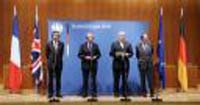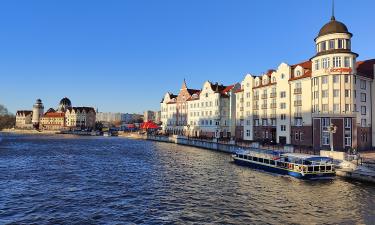G-8 finance ministers open energy talks
Finance ministers from the world's richest countries sat down for talks on energy security Saturday against a backdrop of doubt over Russia's reliability as a secure energy supplier. Playing host to the G-8 for the first time, the world's second-largest oil exporter is eager to highlight its newfound financial muscle and brush away the concerns raised after a gas price war with Ukraine saw supplies to Europe temporarily cut off.

Ministers said in a draft statement dated Feb. 7 that while they expected global growth would remain solid this year, high and volatile oil prices posed a risk, Dow Jones Newswires reported. The draft said finance ministers agree to "take forward work on enhancing the global energy policy dialogue between oil producing and consuming countries."
Russia has seen its coffers swell with billions of dollars from the high oil prices over the past years, and provides about a quarter of Europe's gas consumption. But despite Russia's key role as an energy supplier, it has yet to be admitted as a full member of the group and has been largely kept out of discussions among the finance ministers on big issues such as exchange rates and the U.S. budget deficit. With central bank chiefs absent, those issues are unlikely to be addressed Saturday, officials have said.
Ahead of the weekend talks, some U.S. lawmakers and non-governmental organizations have stepped up rhetoric calling for Russia's exclusion from the group it was invited to join in the 1990s, saying Russia neither shares the other G-8 members' democratic values nor does it measure up economically. Russia's reputation on both counts was damaged by the price dispute around New Year's, when gas supplies to Europe that pass through Ukraine were temporarily shut off in a move widely seen as a salvo against Ukraine's western-leaning government.
President Vladimir Putin has vehemently defended Russia's membership, saying the nation was able to prevent the G-8 from becoming an "assembly of fat cats" by fighting for poorer nations from the perspective of a developing country. The finance ministers from Britain, Canada, France, Germany, Italy, Japan, and the United States were slated to meet with Putin later at the Kremlin.
While the main focus of the meetings is oil, Russia has nevertheless said that diversifying energy sources was a key issue. After a meeting with U.S. Treasury Secretary John Snow on Friday, Brazil's Finance Minister Antonio Palocci said the nation's efforts to develop alternative fuels were attracting attention. Brazil once heavily subsidized its sugarcane-based ethanol program, which it built in the 1970s, but today ethanol is produced at a profit without government help.
"The world has taken notice of the ethanol program in Brazil," he said. "I think we have the only alternative energy program that can economically compete with oil." Other than energy, the fight against infectious diseases, efforts to stem terror financing, and aid to the world's poorest countries will be on the agenda.
Finance ministers from India and Brazil met with deputy ministers from China and South Africa at a working breakfast to discuss international trade. Brazil and India have emerged as leaders among developing nations as World Trade Organization members try to reach agreement on a new global trade treaty. The draft communique also stressed that work was needed to remedy global financial imbalances the U.S. is running a record trade deficit while Asian economies run large trade surpluses that have seen their reserves soar, reports the AP.
N.U.
Subscribe to Pravda.Ru Telegram channel, Facebook, RSS!




